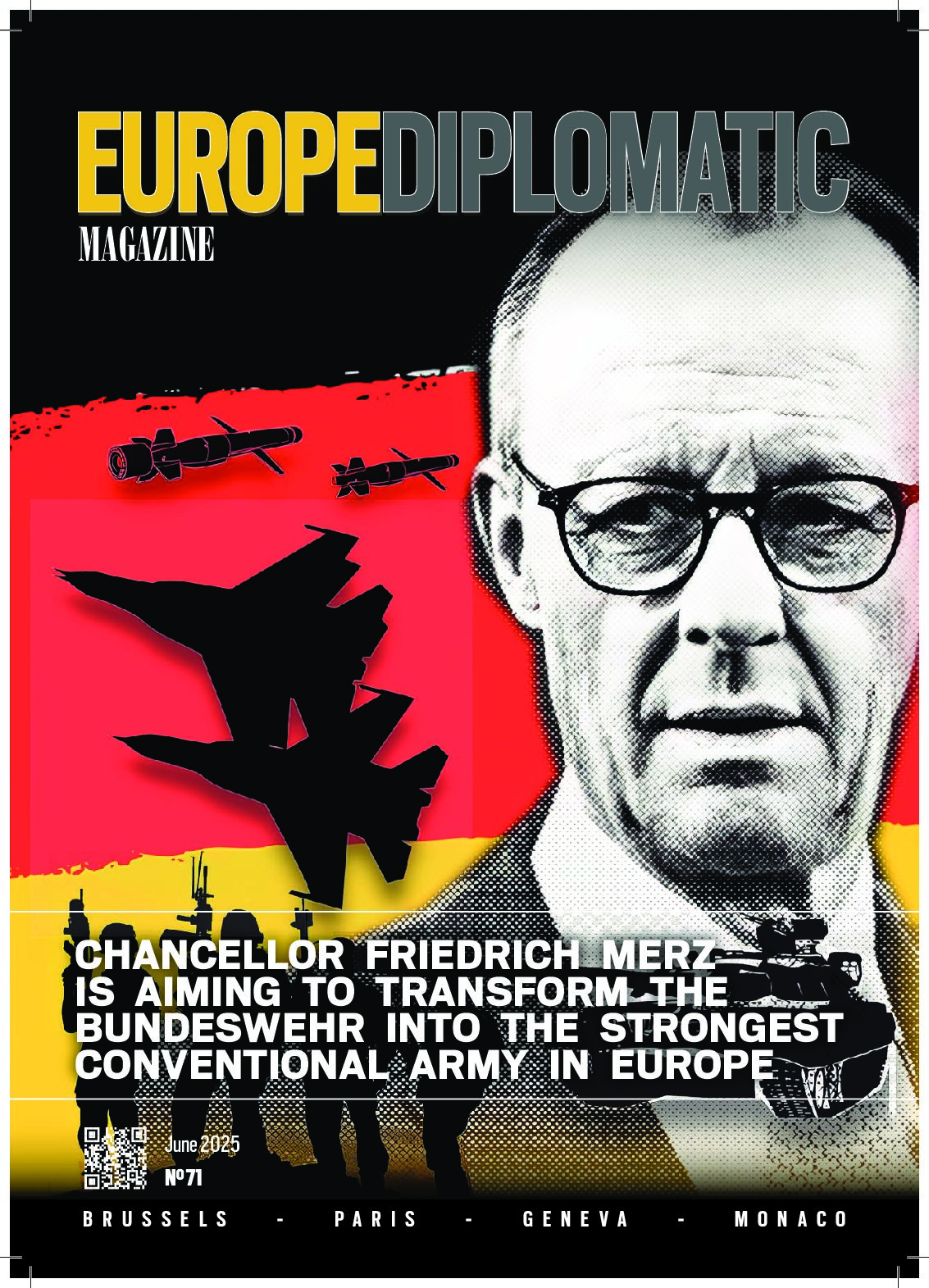Chinese President Xi Jinping and Taiwan President Tsai Ing-wen © Voachinese.cohj
It was never going to be sorted out quickly, easily, nor, perhaps, without a resort to arms. When two fundamentally different governments, opposed in political philosophy, and everything else, both see themselves as the rightful rulers of an extremely large country, and who fervently believe that they should be in sole charge of a particular piece of land (an island, in this case), how can anyone come up with a completely satisfactory solution? Nobody can, of course; it’s simply not possible. That leaves a seemingly insoluble problem that could cost many lives, even though both parties say they believe in good will. Only one of them has shown any, however. The root cause of this tension and propensity for violence on a massive scale is, of course, Taiwan, more than 36,000 square kilometres in size. Taiwan, whose official name is the Republic of China. is one of a string of 168 islands situated in the East China Sea of the western Pacific Ocean some 160 kilometres to the south of mainland China. It’s officially known as the Republic of China. Once called Formosa, which basically means “beautiful island” in Portuguese (it was discovered and named by Portuguese sailors in the 15th century), its indigenous peoples are thought to have settled there more than 6,000 years ago and the place has been inhabited, one way or another, for around 25,000 years. It claims the group of islands it calls Diaoyutai, which are also claimed by Japan as Senkaku and by the People’s Republic of China as Diaoyu. Until the 1980s, it was a one-party military dictatorship, which is never a recipe for peaceful living. The fact that it has not already been swallowed up by mighty (if greedy) China is due, at least in part, to Tsai Ing-wen, Taiwan’s first-ever female president, now in her sixties and still a tough cookie.
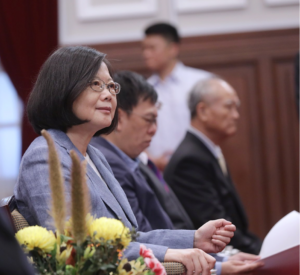
She has presided over this small but very populous country since 2016. The population of Taiwan is made up of four ethnic or subethnic groups: aboriginal peoples, the Fukien Taiwanese (Fukienese [Fujianese], or Hoklo) and the Hakka—and Chinese who came from the mainland in the mid-1940s and after. Aboriginal peoples, who were once the only residents, today make up only some 2 percent of Taiwan’s total population. Its capital is New Taipei City, which covers an area of just over 2,000 square kilometres with a population of over 3.9 million, which makes it a very busy place indeed.
China is, of course, a massive country with a long and not-always-peaceful history. The rule of the Zhou dynasty was China’s longest, lasting 789 years (1046 BCE – 256 BCE). It does not appear to have interacted with Taiwan, which only began to develop agriculture in around 3,000 BCE. It was undergoing ‘civilising’ from the Palaeolithic era (50,000 – 10,000 years ago) period. Chinese people do not appear to have crossed the 100-or-so kilometres to the island to settle there until the late 13th century and later. Apparently, it was never ruled by the Zhou dynasty, who may not even have realised it was there. In the vulnerable seagoing vessels in use at the time, a 100-kilometre crossing of an often-turbulent strait was no easy matter. Now, of course, we think in global terms and on greater scales. To the Chinese rulers of today, it’s clear that Taiwan must be a part of China. In the 17th century, it was the Dutch and Spanish empires that competed to control it. Later, China’s Qing dynasty took over but considered Taiwan ‘wasn’t worth fighting over’.

They should have listened to the Zhou dynasty’s great philosopher. “Better a diamond with a flaw than a pebble without”, said the great Kǒng Fūzǐ, better known as Confucius, or 孔子 in Chinese, (it means Master Kǒng, by the way), China’s greatest and certainly most famous philosopher, who lived some 2,500 years ago, at the time of that long-lasting Zhou dynasty. He is still regarded with deep respect, although at the time the Zhou rulers began to doubt his wisdom and finally decided that they didn’t like him after all. Confucius had argued that stability in a country depended upon basic relations between the ruler and the ruled and that a king should not issue laws, nor set out fixed punishments. Rather, people should observe ‘codes of morality’, conduct all the various religious ceremonies properly (he didn’t want them to annoy the gods), seek an education and be loyal to their parents. Not everyone agreed. A period of civil strife persuaded the leaders of the Zhou to seek alternative advice and all of the writings of Confucius were burned on the advice of his replacement, Shang Yang. Why does that matter? Because the history of China as a separate country, a political entity in its own right, goes back further than most of the others (the oldest of all is Armenia). But let’s concern ourselves with the 20th century, which proved to be a decisive one for China and its people.
Take the case of Manchuria. For years, Japan had been benefiting from conflict between Chiang Kai-Shek’s nationalists and Mao Zedong’s Communists. Japan even installed a puppet government there in 1931. Tensions with China continued to rise and on July 7, 1937, Japanese soldiers undertook some night-time training exercises not far from Beijing, close to a stone bridge named after the Venetian merchant Marco Polo. During the exercises, a Japanese trooper called Private Shimura Kikujiro got lost in the dark while taking a toilet break and thus failed to return to base. The Chinese guards refused to allow his worried Japanese comrades access to the adjacent town of Wanping to search for him and the argument turned violent. It became known as ‘The Marco Polo Bridge incident’ and, for the only recorded time in history (as far as I know), one man taking a break to relieve his bladder ignited a global conflict: first of all the Second Sino-Japanese War, which in turn led by circuitous routes to the Second World War. In 1940 and 41, US President Franklin D. Roosevelt extended credits to China to allow the country to buy weapons, and then blocked its trade with Japan in aircraft and scrap metal. That was one of the principal reasons for Japan’s attack on Pearl Harbour. Small arguments have a habit of growing exponentially where national pride and large weapons are involved.
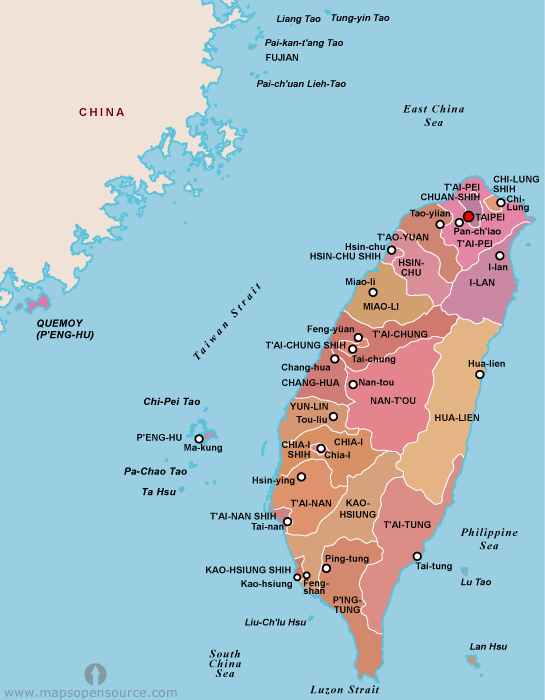
WAR DAMAGE
As is well known, the Second World War eventually came to an end after a terrifying amount of bloodshed. Taiwan had been ceded to Japan in 1895 under the Treaty of Shimonoseki and following the Japanese surrender at the end of the Second World War, it was handed over to the Kuomintang government of China. Administration was placed in the hands of Chen Yi, a nationalist, but his rule was terribly corrupt as well as inefficient, and the island’s economy was failing. In 1947, the arrest of a cigarette seller led to violence in which a bystander was killed, and that in turn led to violent clashes between residents and the police and eventually an uprising against Chen Yi. The KMT government sent troops to suppress the crisis and a large number of residents who had not been connected with the trouble were killed. Even so, the Americans came to see Taiwan as a strategic place during the Korean War, and the US Seventh Fleet began to patrol the Taiwan Strait. Tensions remained in a bizarre game of cat and mouse, then in 1971, just before the United Nations recognised the Communists as China’s legitimate rulers, the nationalist representatives walked out of the UN, leaving Mao Zedong and his followers as China’s undisputed government. At least, undisputed by most countries.
From Beijing’s point of view, where does that leave Taiwan now? Another Confucius quotation may not sit too well with Xi Jinping’s uncompromising and profit-obsessed administration in Beijing. “He who exercises government by means of his virtue may be compared to the north polar star, which keeps its place, and all the stars turn towards it.” I’m afraid I don’t see other countries turning enviously towards China to enjoy its far-sighted and kindly virtues. China has become a bully, ruled by an autocrat, inflicting itself on others whether they want it or not. Most often they do not. As for Socialism and Marxism, and, indeed, humanity, Xi falls woefully short by any measure. Karl Marx and Leon Trotsky would have had a fit. It would seem that Xi’s only interest is in profit, thus enriching himself and his acolytes and forcing compliance upon those who find themselves, however unwillingly, under his power. Xi is certainly not a star to whom other stars turn in admiration; he’s more like a rogue planet, drawing others, possibly against their better judgement, into his orbit. On the other hand, Tsai Ing-wen could perhaps qualify as that star, standing bravely against her mighty neighbour.
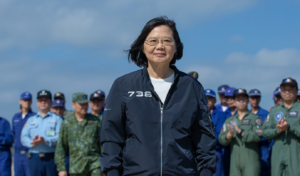
When she took office, her basic policies – without mentioning defence – included pension reform, long-term care for the elderly and justice reform: a mild, widely-acceptable raft of policies. She also set up a human rights commission and talked about shifting her country’s economy even more towards the semiconductor manufacturing industry, in which Taiwan excels. She rejects Xi Jinping’s proposal for a “one country-two systems” solution, because she knows that really means having Xi in charge of everything, preferring to see both sides of the Strait co-existing amicably. That’s certainly not a view shared by Xi. For him, only Taiwan’s total submission will suffice. Tsai informed Xi, in response to a letter of his suggesting that ‘one country, two systems’ was the inevitable, mutually agreed outcome of a 1992 summit at which, he said, ‘consensus’ had been reached. Tsai wrote back to deny the existence of this ‘consensus’, while hoping that negotiations would continue. Ever-irritable, Xi called Tsai’s response ‘incomplete’ and broke off further cross-strait communications, other than through official channels. During a speech in 2021, Tsai again rejected the ‘one country, two systems’ solution, saying the two countries do not belong to each other.
They do face each other across the Taiwan Strait, however and Tsai has increased military spending as a proportion of Taiwan’s GDP because of it and the risk of expansionist tendencies by mainland China. The defence spending budget had been set in 2018 at $327-billion (€10.56-billion), rising to $347-billion (€11.2-billion) in 2019. In 2020 it rose to $411-billion (€13.26-billion), an 8.3% increase on the previous year. Tsai has also boosted interest in self-sufficiency in defence and developing home-grown industries to construct submarines, missiles and the AIDC T-5 Brave Eagle jet trainer, which successfully conducted its first test flight in 2020. In November 2021, French MEP Raphael Glucksmann led the first official EU visit to Taipei, while Taiwan, under Tsai, has tried to become more open by making more of the many languages official. She wants even the rarely used old indigenous languages to enjoy the same respect and protection as Mandarin. So, who is this courageous woman, defying the mighty Xi?
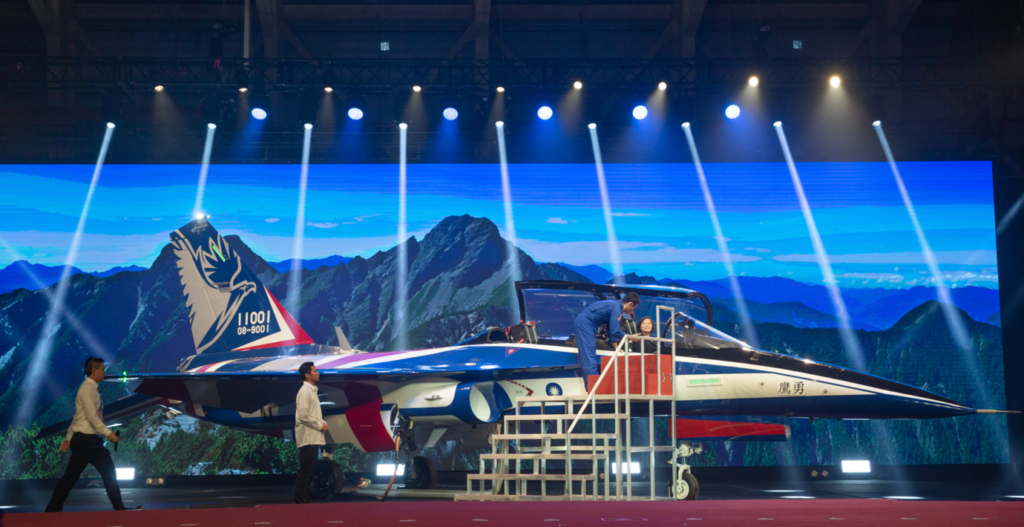
WHO COULD CHOOSE TO LEAVE XI JINPING?
The Chinese Communist Party views her as the architect of separatist policies. She knows that she is and will remain a target for Xi and his allies. “They will come right up the Tamsui river to get me,” she told a foreign visitor. China is alleged to have plans to capture and/or kill her. Tsai, however, is no firebrand. She’s a lawyer who helped her country gain access to the World Trade Organisation and is a lover of technical details who is known for her caution. One member of her own Democratic Progressive Party (DPP) described her as “subdued, prudent, thoughtful and cautious”. None of those words could apply to Xi. Tsai has earned respect, holding a professorship at Soochow University School of Law and the National Chengchi University. She supports LGBTI rights and wants Taiwan to legalise same sex marriage. Of her personal background, Tsai’s paternal grandfather came from a prominent Hakka family in Fangshan, Pingtung. Her grandmother, from Shizi, Pingtung, was of aboriginal Paiwan descent. Tsai’s father, Tsai Chieh-sheng owned a car repair business, while her mother is Chang Chin-fong, the last of her father’s four mistresses. A busy man, clearly. Tsai is thus the youngest of four children and has seven elder half-siblings on her father’s side as well as a half-brother on her mother’s side. She is the first Taiwanese president of aboriginal descent, and the second of Hakka descent. Genetics is a busy topic in Taiwan.
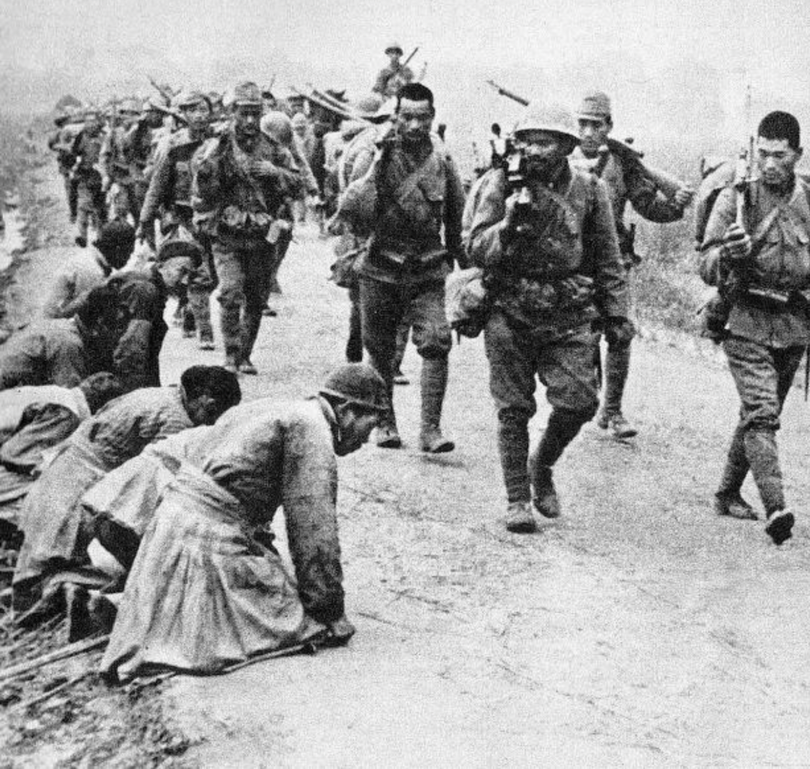
China had suffered terribly in the Second World War and in the brutal Japanese occupation that preceded it. During that period, more than 14-million Chinese people were killed or wounded. Thousands of them, soldiers and civilians alike, were locked up by the Japanese; when the war ended only 56 of those prisoners were found to be still alive. The Japanese soldiers had massacred men and committed mass sexual assaults on women because they could and because it amused them, apparently believing in their racial superiority. Even the dropping of atom bombs on Hiroshima and Nagasaki didn’t bring the fighting to an end. China was familiar with war and had been especially since the overthrow of the Qing Dynasty in 1911 (the dynasty had been founded in 1644), and having suffered mass starvation, revolt and foreign invasion for much of the previous century. The old imperial system was finally extinguished by Sun Yat-Sen and his Nationalists with the aim of achieving true independent nationhood, kicking out all foreign occupation forces and restoring relative wealth (or at least welfare) to China. It was not about to happen, at least not straight away. China was plagued by local war lords who insisted on obedience with threats of death. The writer and journalist Robert Payne told me, when I interviewed him many years ago for the BBC’s “Woman’s Hour” radio programme, that the forced obedience included the warlord and his men turning up at the house of any attractive young woman due to marry the next day to insist that the lord and his top men raped her first, as was their right, they believed. They seemed to think it was an honour for a peasant girl to be raped by the local war lord and his clan of bullies. At least the CPC has put an end to that kind of wickedness.
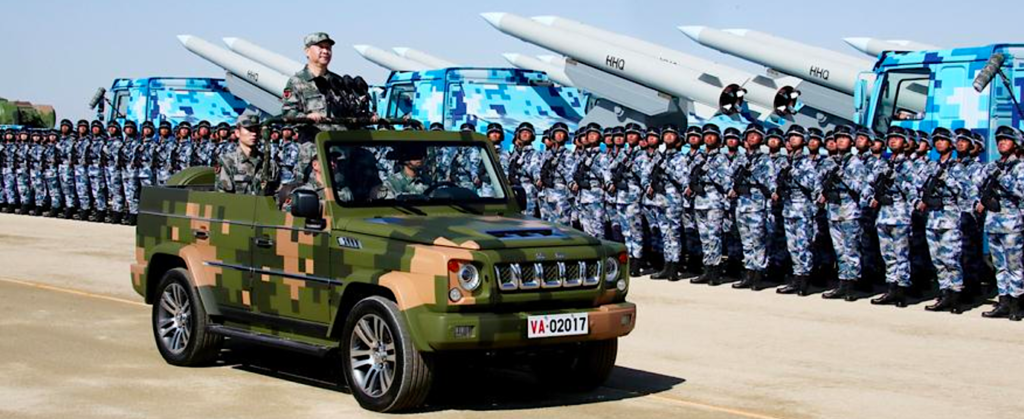
China Daily describes it as “Sinofication”, the process of fusing various aspects of culture, Chinese and foreign, and adapting them to suit present day reality, or at least Xi Jinping’s interpretation of it. Part of his master plan is to bring Taiwan under his total control. President Xi Jinping has said “reunification” with Taiwan “must be fulfilled” and he has not ruled out the possible use of using force to achieve this. It’s worth remembering that the Chinese Communist Party is only just over a century old. Its founding in 1921 was arguably the most important event in China’s 20th century history, apart from its involvement in wars. Its founders, such as Chen Duxiu and Li Dazhao, espoused Marxism and drew inspiration from the Bolshevik revolution next door, listening to the clarion call of Vladimir Lenin and the Communist International. They were hopeful that they could build a classless society of true equals. Some hope. It would seem that the creation of a truly classless society is not one of Xi Jinping’s aims in life. If it were, it’s unlikely that he would have created slave labour camps for his Uyghur population. It’s far from impossible that the sight of how Xi treats the Uyghurs further encourages the Taiwanese to resist any moves towards unification. It seems certain that the Uyghurs themselves would love to free themselves from Chinese rule if only the world’s Muslim countries would come to their aid. And they should: it was the Prophet Muhammad himself, after all, who wrote that: “A Muslim shall never leave another Muslim helpless in the time of need.” It would be hard, perhaps, to blame the Uyghurs for hoping that a brother Muslim country would take up arms on their behalf, although China is, of course, very powerful. Mainland China, after all, has many more troops, much more powerful weapons and a more blindly obedient citizenry than little Taiwan. And Xi is unbelievably prickly, taking offence at very little.
REPEATING THE MISTAKES OF THE PAST
Britain made a great many mistakes in the 18th and 19th centuries, even when putting a reluctant (on Britain’s part) end to slavery. The British paid £20-million (€23.72-million) in compensation to the former slave owners for depriving them of what they clearly saw as their “property”, but they gave nothing to the slaves, despite their indisputable years of hard, unpaid work. Britain also went to war with China to ensure it could sell its narcotics there.
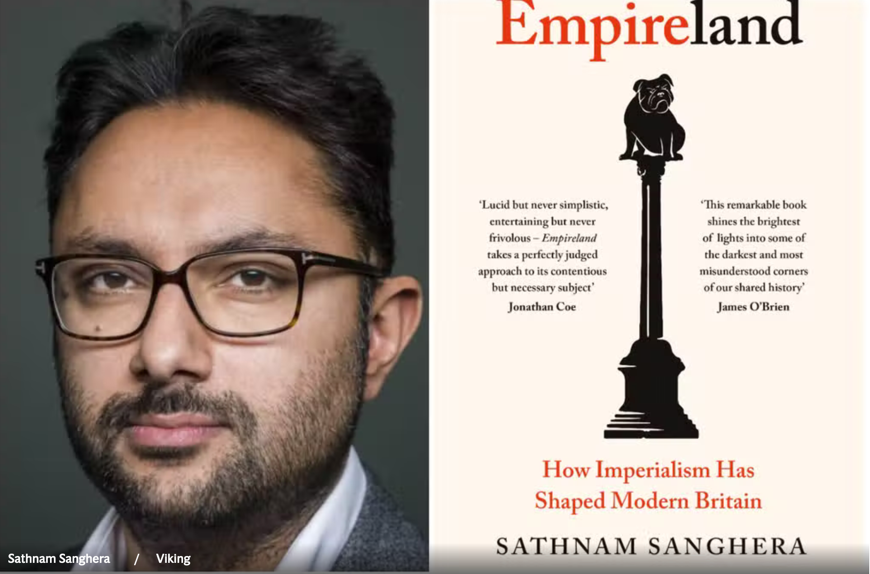
China wanted to ban the importation of opium, which was harming its citizens, but Britain invaded to change China’s mind by force. Drug dealing was a profitable trade. China refers to the period that followed, with opium in ready supply, its profits all going to British companies, as “the century of humiliation”. Sathnam Sanghera’s superb book, “Empireland”, about British imperialism and its long-term consequences, quotes the Chinese scholar, Yan Fu, who, writing in 1895, said: “A group of island barbarians wearing wild clothes, with a birdlike language and animal-like faces, sailed to our shores from thousands of miles away and knocked on our gates, requesting access. When they failed to attain their aims, they breached our coastal defences, imprisoned the officials of our land, and even burned the palaces of our emperor.” One might imagine that China’s leaders of today would prefer to emulate the dignified Chinese leaders of that time, despite their defeat, rather than the barbarians (the British) at the gate. But Xi Jinping is a very ‘tetchy’ man, seeing insults and threats where none were intended as an excuse to roll out and show off his military hardware. It’s been done before but it seldom ends well.
However, the majority of countries in the world share China’s belief that the visit to Taipei by Nancy Pelosi, the House Speaker in the United States House of Representatives, was a provocation and could be viewed as “interference” in China’s affairs. Although China sees Taiwan as a “breakaway” province it wants to reclaim, the island has been running its own affairs as an independent country since 1949. It’s a status the Taiwanese are reluctant to see brought to an end. Xi Jinping is not the first man of that name to have sought to rule China in a way ‘he’ saw as fair. In 244 BCE, there was a scribe, also called Xi, who took up his post under the Zhou dynasty when he was just 19 years old. He was clearly gifted and began to try legal cases as a judge less than a decade later. The documents found in his tomb confirm that he must have consulted a great many legal papers and statutes day-by-day on matters of administration and legal precedent. He earns several pages in Fernanda Pirie’s ambitious and far-reaching book about the birth and evolution of law and order throughout the world over the last four millennia, “The Rule of Laws”. It’s a fascinating and compelling read, by the way.
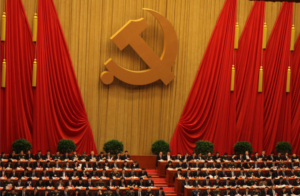
The historic Xi seems to have been more firmly committed to imposing and administering a fair and just system of laws and punishments than his present-day namesake. The Xi of long ago looked after granaries, currency and the appointment of officials, among many other things, also serving as the investigating officer into alleged crimes. He was, perhaps, a kind of ancient Chinese Hercule Poirot. He was inclined to reduce the prescribed punishments for various crimes, preferring leniency to a show of brutal power.
There’s not much to indicate that Xi Jinping would choose to follow that path during the more recent post-war years. However, we must remember the terrible state into which China had sunk after the Second World War and eight years of bitter fighting: the economy was wrecked; much of the infrastructure had been destroyed (or stolen and taken away, either by the Japanese or the Soviets). Many cities had been bombed out of existence by either Japanese planes in the early years of the war or later by American planes whose pilots believed the defeated Japanese forces were hiding there. Agriculture had been very severely hit and there was widespread famine, providing insufficient to feed the millions of refugees, let alone the starving citizens. The Xi of long ago never had to face such dreadful conditions. With the Japanese gone or going, the various towns and cities were claimed either by the Kuomintang nationalists or the Chinese Communist Party, while Manchuria was in the hands of Soviet armies, albeit not for very long.
JAPAN ADMITS DEFEAT
Then there was the issue of the Japanese surrender. There were literally millions of Japanese soldiers on Chinese soil. Some of them surrendered to the Kuomintang while more than half a million of them were captured by the Soviet Red Army and taken back to the Soviet Union, allegedly as slave labour.
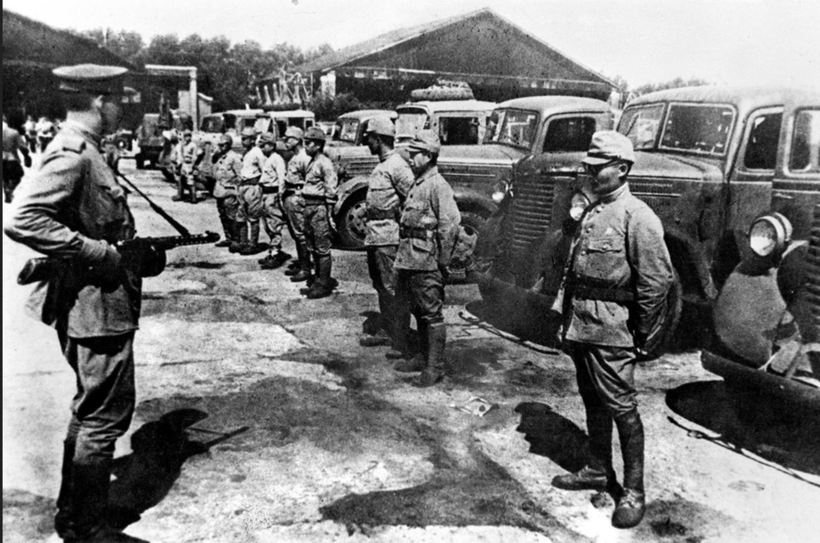
There was also a massive wave of confiscations of formerly Japanese properties: schools, factories, railways, vehicles, and houses alike were seized, in many cases by Soviet forces, and even travel using China’s widespread and useful network of canals became impossible because the Japanese had seized (for which read ‘stolen’) every vessel they could find, while many railway locomotives and rolling stock ended up in the Soviet Union, also the victims of theft. Much of the material seized back by the Chinese ended up in the hands of the Kuomintang, which made no attempt to make itself popular by, for instance, giving it back to its former Chinese owners. The remote and unfriendly Chiang Kai-Shek believed in the military and in elitism, which would never endear him to a country recovering from such a vicious war, while Mao Zedong was gaining in popularity through people-friendly actions. The Communists also controlled an army of almost a million soldiers and something like twice that number of militiamen, while a skilfully-planned publicity campaign won over the peasants in droves. There was very little in the way of ‘vengeance’ attacks on the remaining (disarmed) Japanese troops. It’s surprising really; according to Jonathon Fenby’s very informative book, ‘The Penguin History of Modern China’, in the so-called “Rape of Nanjing”, Japanese troops competed to see who could behead the greatest number of Chinese prisoners. It’s hard to understand how human beings could have done such awful things for fun, but they did. The photographs in Fenby’s book show the Japanese troops laughing while they were doing it, in one instance attaching the severed head to a wall.
SORTING OUT THE MESS
After the war and Japan’s surrender, there was a massive mess to clear up. With US assistance, more than two million Koreans who had been brought to Manchuria as slaves by the Japanese, were repatriated.
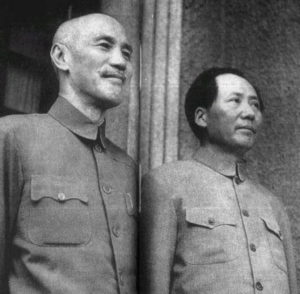
With Japan out of the picture, the KMT realised it was facing seemingly insurmountable problems: massive inflation, social issues, a loss of manpower, a weak administration and a lack of any kind of vision for the future. Out in the countryside, soldiers who had left whatever sort of military structure of which they had been part – army, marines, paratroopers or whatever – were looting the farms and houses. China took control of Taiwan from Japan, but in a condition of deep tension from the Nationalists, who seized the best assets while imposing a harsh and unpopular military rule. Two days after the surrender of Emperor Hirohito, Mao agreed to concede to the wishes of the Soviet Union and meet with Chiang Kai-Shek, something he very much did not want to do. When the aeroplane in which he was travelling landed in Yenan, Mao said that military and political problems should be resolved “in accordance with justice and reason, as well as on the basis of peace, democracy, and unity,” adding: “We must build a unified, independent, prosperous, and strong new China.” It’s a great idea, but while Mao was under no illusions regarding the Americans, the nationalists, who had performed so poorly against the Japanese throughout the war, retained their illusions, imagining, perhaps, that the Americans would come along to do the heavy lifting and leave the subsequent running of the country to those who had proved conclusively that they couldn’t handle the responsibility. If only they’d had Tsai Ing-wen to help them…
So, what happened to Taiwan when the war ended? It was, after all, the island to which Chiang Kai-Shek and his rather unpopular Nationalist forces fled following their defeat at the hands of Mao Zedong’s Communist army. At the end of the Second World War, Japan surrendered and was occupied by allied forces, while Taiwan was put under the control of China’s government, the ROC (Republic of China), which back in those days meant Chiang Kai-Shek’s Kuomintang, but in February 1947 the locals rose up against the Kuomintang in response to their cruelty and there was a massacre, which led to the governor of Taiwan, Chen Cheng to declare martial law. What followed was the Chinese civil war in 1949, at the end of which the KMT’s Republic of China (ROC) was forced to retreat from mainland China, where Mao’s Communists had declared the People’s Republic of China. So, the Kuomintang retreated to Taiwan and then continued to claim that they were the sole legitimate government of China; all of it.
However, the United Nations eventually stepped in to stop the pointless squabbling by expelling the ROC as China’s representative government there, replacing it with the PRC (People’s Republic of China). Complicated, isn’t it? It is also, of course, unfinished business. It would be possible, arguably, for China to try to win back Taiwan with a charm offensive, but (because Xi has very little charm but lots of big weapons) a military confrontation seems more likely, especially now, following the Nancy Pelosi visit.
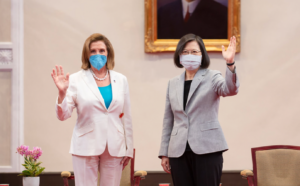
Apart from anything else, the People’s Republic can outgun Taiwan many times over. It has 2,035,000 troops on active service, compared with Taiwan’s 169,000. China can boast 965,000 ground troops; ten times the number Taiwan can field. China has 260,000 sailors to Taiwan’s 4,000. As for ordnance, China has 5,400 tanks to Taiwan’s 650. China also has 3,227 warplanes to Taiwan’s 500 or so, and it has 59 submarines while Taiwan only has 4 and when it comes to artillery pieces, China can boast 9,834 to Taiwan’s 2,000. Without outsiders joining in, it would look – on paper – like being quite a short war.
POKING THE HORNET’S NEST
Tensions between China and Taiwan are still strong since the visit of the Speaker of the House of Representatives to Taipei. Nancy Pelosi has been denounced far and wide as a fomenter of trouble, even though it was an unimportant private visit and could be seen as Pelosi’s “last hurrah” before she steps down as speaker in November. Xi would have been far better advised, I think, to play down the significance of the trip, pointing out the relative unimportance and powerlessness of her position in US politics. As it is, she is now seen as a far more heavyweight figure than she really is. Some have suggested that Xi was in any case looking for an excuse to scare Taiwan and show off his military hardware.
Playing down the visit would have shown Xi as a balanced and sensible world-class leader instead of someone who is hysterically jittery. In fact, of course, knowing of Xi’s tendency to over-react it was undoubtedly unwise to go ahead with the visit, as China’s military exercises in and around the Taiwan Strait have demonstrated. China’s official media has branded the visit: “a political stunt”, and it would seem they have a valid point, even if it was a stunt that played into Xi’s hands. Both China and Taiwan fielded around 10 warships in the area after Pelosi left. More sabres to rattle, of course. Japan has announced that it fears five of China’s long-range ballistic missiles may have landed in its own Exclusive Economic Zone (EEZ), possibly unintentionally. Japan has lodged an official protest anyway. Japanese foreign minister Yoshimasa Hayashi also called for an “immediate stop” to Beijing’s military drills around Taiwan, which he fears may “have a serious impact on the peace and stability of the region and the international community.” Beijing has now announced that they have ended.


Of course, Taiwan is the world’s largest producer of semiconductors or chips, and China needs them, as does every other industrialized country. So why not just invade and seize them? It would be a disaster for the rest of the world, but semiconductors are fragile, delicate products whose manufacture demands the application of a wide range of hard-to-get (and expensive) chemicals at just the right moment and in the exact proportions required. The work must take place in “clean rooms” using ingredients of the very highest purity. China has tried to catch up with Taiwan but is said to be “nowhere near” matching what Taiwan can do. A single semiconductor may be thinner than a human hair and yet contain 40-billion components. China will not be catching up with that technology any time soon. So, China is unlikely to risk disrupting its own access to chips in return for doubtful military or strategic advantage and the risk of American retaliation. That would be one hornets’ nest in which China would definitely get very badly stung.
Meanwhile, the US administration has issued a warning that China is planning further ‘provocations’ over Pelosi’s visit, unintentionally (perhaps) increasing the risk of escalating the row with Beijing over the Pelosi visit. The US National Security Council spokesperson, John Kirby, told journalists that China would appear to be taking steps to raise the temperature by its actions.
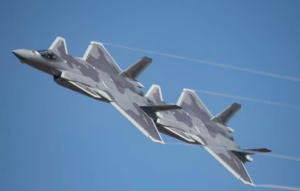
“These potential steps from China could include military provocations, such as firing missiles in the Taiwan Strait or around Taiwan,” adding that these could be: “operations that break historical norms such as large-scale air entry into Taiwan’s air defence identification zone,” and also: “air or naval activities that cross the median line and military exercises that could be highly publicised.” He was speaking ahead of Pelosi’s arrival in Taiwan, since when the temperature of Sino-American relations has dropped well below the surface temperature of Pluto. A spokesman for the Pentagon told the media that the US believes China “will not invade Taiwan for two years”, but officials in Taiwan are understandably nervous. Taiwan Foreign Minister Joseph Wu warned that: “China has used the drills in its military play-book to prepare for the invasion of Taiwan.” He seems not to be convinced by Washington’s ‘2-year’ assessment of China’s intentions. “It is conducting large-scale military exercises and missile launches, as well as cyberattacks, disinformation, and economic coercion, in an attempt to weaken public morale in Taiwan. After the drills conclude, China may try to ‘routinise’ its action in an attempt to wreck the long-term status quo across the Taiwan Strait”. Tsai will not stand idly by; she is of Taiwanese aboriginal descent, and her name, simplified by her father to 英文, could be translated as “heroic literature”. Tsai has already proved herself to be heroic, so her name is likely to be recorded in literature. She is unmarried.
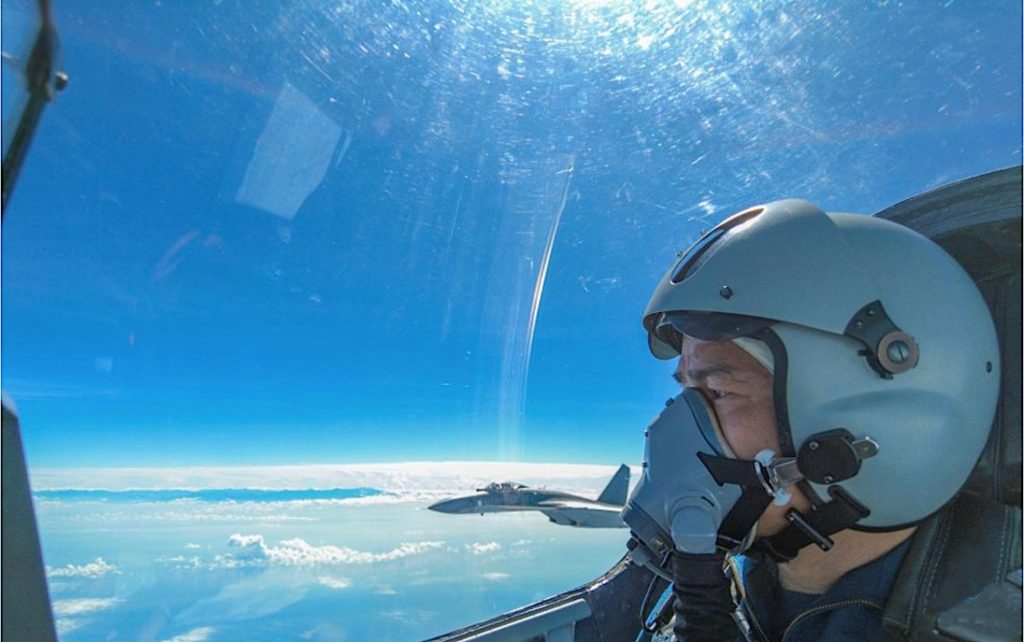
LESSONS FROM VLAD
As for China’s intentions, all that remains puzzling is the timescale; there is no serious doubt that China will seize Taiwan by force, a source of great anxiety for Tsai and others Diplomats have told journalists that when it does, it will do so in a lightning 48-hour strike, giving the rest of the world no time to react. However, many Western diplomats are working on the assumption that Xi and his team have learned from Russia’s unexpected failure to seize Ukraine as quickly as they expected, following their earlier rapid taking of Crimea. It’s clear that Putin had expected a push-over and found himself instead bogged down in a quagmire of fierce resistance. The sudden, all-encompassing ‘blitz’ seems to be what Beijing favours, rather than a gradual take-over, squeezing the opposition out by rolling tanks and troops across the land and blowing up as many buildings as it can. According to Ireland’s Independent newspaper: “Chinese leaders have reportedly deduced that it took at least two days for western leaders to properly respond when Vladimir Putin launched his brutal assault on Ukraine on February 24, and that this is the crucial window of time when irreversible gains can be made.”
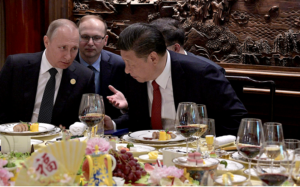
Xi apparently believes that Putin’s biggest mistake was failing to seize Kyiv in the first 48 hours, and thus destroying Volodymyr Zelensky’s government. By taking their time, the Russians left open the possibility that Western countries would rally to its aid, (which the Russians, strangely, were not expecting), at least by supplying weapons and other goods, which they did and continue to do. The Irish Independent goes on to quote Sidharth Kaushal of the think tank, Rusi, who has pointed out that any military action by China would risk the strong possibility of war with the United States, which Xi will probably prefer to avoid. And there’s another concern, Kaushal notes: “Despite reportedly being the world’s biggest army, the PLA is untested in combat, and failure could fatally undermine President Xi’s hold on power ahead of a key party congress at which he is expected to be granted an unprecedented third term”. Kaushal doesn’t believe such a war would be easily winnable for China at the moment.
TRADING FUTURES?
Some observers have noted that Taiwan would be more likely to accept the idea of a Chinese takeover if there was clearly “something in it for them”. Being governed and overseen by Xi is not an alluring prospect. However, Beijing has long talked about linking China and Taiwan physically, with a bridge or a tunnel. China’s State Council has already approved – almost a decade ago – two highway projects. As reported in the South China Morning Post: “One involves the long-proposed Beijing-Taipei Expressway, which would start in Beijing and pass through Tianjin, Hebei, Shandong, Jiangsu, Anhui, Zhejiang and Fujian’s Fuzhou before crossing the strait and reaching Taipei. Another inland route would start in Chengdu and pass through Guizhou, Hunan, Jiangxi and Fujian’s Xiamen, and cross the Taipei-administered Kinmen archipelago before eventually ending at Kaohsiung in southern Taiwan.”

In either case, it would be a massive project, costing many billions of euros, whether China opts for a bridge or a tunnel under the sea. It would have to stretch 180 kilometres, but China has recently resurrected the idea of a bridge, predicting that it could be in place by 2035. There would inevitably be security concerns (it would be an easy target) and also worries about the geology; just how stable would such a structure be? It could be to Taiwan’s advantage: trade with mainland China and Hong Kong accounts for a third of Taiwan’s economy.
Since the Presidency of Donald Trump, the United States has retreated from global leadership, apparently more interested in domestic issues. This leaves a gap at a global scale that China could fill to its obvious benefit, but under Xi it won’t do that. As Elizabeth C. Economy explains in her fascinating book, ‘The Third Revolution: Xi Jinping and the New Chinese State’, “US and Chinese priorities, policies, and values are not aligned. Moreover, China cannot be a leader in a globalized world while at the same time closing its borders to ideas, capital, and influences from the outside world.” She recommends that the US and other Western powers, while seeking cooperation with China, must remain prepared and ready to tackle China if it becomes over-ambitious. Under Xi Jinping, that remains a very real possibility. It’s a fact of which Tsai is painfully aware. She knows Taiwan could never win a shooting war against China, but she is continuing to make Taiwan an ever
-more capable and peaceful manufacturing hub for the most delicate and essential products on Earth. So, she waits, always striving to improve her country and improve life for its citizens, who are unlikely ever to welcome Xi as her replacement. His greatest interest seems to be to take what is of value while ignoring calls for justice. He should read Confucius, who wrote: “The superior man understands what is right; the inferior man understands what will sell.” Tsai understands what is right, it seems. And XI? Well, he has dropped his pledge not to station troops in Taiwan, so the idea of ‘one nation’ in peaceful co-existence with itself, free of strife, seems more remote than ever. And Xi should forget the idea of attacking Taiwan and remember another saying of Confucius: “Don’t do unto others what you don’t want others to do unto you.”
